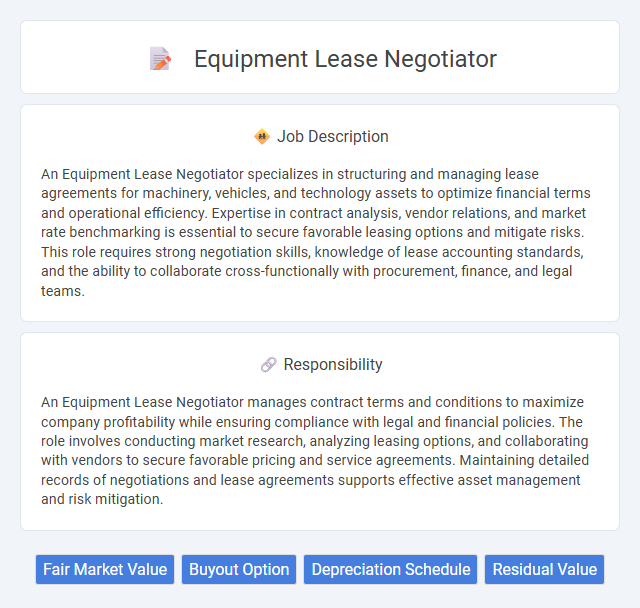
An Equipment Lease Negotiator specializes in structuring and managing lease agreements for machinery, vehicles, and technology assets to optimize financial terms and operational efficiency. Expertise in contract analysis, vendor relations, and market rate benchmarking is essential to secure favorable leasing options and mitigate risks. This role requires strong negotiation skills, knowledge of lease accounting standards, and the ability to collaborate cross-functionally with procurement, finance, and legal teams.
Individuals with strong negotiation skills, confidence, and a results-driven mindset will likely be well-suited for an Equipment Lease Negotiator role. Those comfortable working in high-pressure environments and adept at building relationships with diverse clients probably have a higher chance of success. Candidates who lack interpersonal skills or struggle with problem-solving may find the demands of this position challenging.
Qualification
Equipment Lease Negotiators must possess strong communication and interpersonal skills to effectively negotiate lease terms and build client relationships. Proficiency in financial analysis, understanding lease agreements, and knowledge of market trends are essential for optimizing contract conditions. A background in sales, finance, or business, combined with certifications in leasing or contract management, enhances credibility and performance in this role.
Responsibility
An Equipment Lease Negotiator manages contract terms and conditions to maximize company profitability while ensuring compliance with legal and financial policies. The role involves conducting market research, analyzing leasing options, and collaborating with vendors to secure favorable pricing and service agreements. Maintaining detailed records of negotiations and lease agreements supports effective asset management and risk mitigation.
Benefit
Equipment Lease Negotiator roles likely offer significant benefits such as negotiating favorable lease terms that reduce operational costs and improve cash flow management. Expertise in this position probably leads to securing flexible contract options and minimizing financial risks associated with equipment acquisition. Strong negotiation skills may result in enhanced vendor relationships and maximized value from leased assets.
Challenge
The Equipment Lease Negotiator role likely involves navigating complex contract terms and balancing the needs of both lessors and lessees, posing a significant challenge in ensuring favorable outcomes. Encountering fluctuating market conditions and equipment availability might require adaptability and strategic thinking to secure optimal lease agreements. Effective communication and negotiation skills are probably essential to overcoming obstacles and reaching mutually beneficial solutions in a competitive environment.
Career Advancement
An Equipment Lease Negotiator excels in securing favorable terms for leasing equipment, leveraging strong negotiation and market analysis skills. Mastery in contract management and financial evaluation can lead to senior roles such as Lease Manager or Director of Equipment Leasing. Advancing this career often involves gaining expertise in industry-specific regulations and expanding a professional network to increase deal opportunities.
Key Terms
Fair Market Value
An Equipment Lease Negotiator specializes in structuring lease agreements that accurately reflect the Fair Market Value (FMV) of equipment, ensuring cost-effectiveness and compliance with accounting standards. They analyze current market trends, depreciation rates, and asset conditions to negotiate terms that optimize financial outcomes for both lessors and lessees. Mastery of FMV assessments helps prevent overpayment and aligns lease agreements with industry benchmarks, fostering transparent and equitable transactions.
Buyout Option
Equipment lease negotiators specialize in structuring lease agreements with a keen focus on the buyout option, allowing lessees to purchase the equipment at the end of the lease term for a predetermined price. Mastery over buyout clauses enhances the ability to secure favorable financial terms and maximize asset utilization for clients. Expertise in buyout negotiation supports cost-effective decisions and long-term equipment ownership strategies.
Depreciation Schedule
An Equipment Lease Negotiator must thoroughly analyze the depreciation schedule to optimize lease terms and ensure cost-effectiveness over the asset's useful life. Accurate assessment of depreciation rates directly impacts monthly payment calculations and residual value estimates, influencing negotiation leverage with vendors. Understanding the depreciation schedule enables strategic decision-making to minimize financial risk and maximize return on leased equipment.
Residual Value
Equipment lease negotiators play a critical role in determining the residual value of leased assets, which directly impacts lease terms and payments. Accurately assessing residual value involves analyzing market trends, asset depreciation rates, and industry-specific usage patterns to forecast equipment worth at lease end. Effective negotiation ensures optimal financial outcomes for both lessors and lessees by balancing residual risk and lease cost.
 kuljobs.com
kuljobs.com